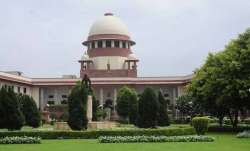Who are the minorities in Jammu and Kashmir? SC asks central, state governments
The Supreme Court on Monday asked both the central as well as the Jammu and Kashmir governments to clarify who constituted minority community in the state.

The Supreme Court on Monday asked both the central as well as the Jammu and Kashmir governments to clarify who constituted minority community in the state.
The apex court was hearing a Public Interest Litigation (PIL) which alleged that the Jammu and Kashmir government had been giving funds meant for minority community to Muslims who formed the majority in the state.
The PIL also requested the Supreme Court to appoint a committee to identify minority communities in Jammu and Kashmir and stop all disbursement of monetary benefits to minority communities in the state till the committee gave its report.
Terming it an important issue, the apex court bench comprising Chief Justice J S Khehar, Justice D Y Chandrachud and Justice Sanjay Kishan Kaul sought response from both central as well as the Jammu and Kashmir governments.
"It is a very very important issue. The manner in which things have emerged has to be kept in mind while finding a solution. If some protection has to be accorded to the minorities, who else but the government is in a better position?" the SC bench was quoted as saying by Times of India.
Senior advocate Gopal Subramaniam, appearing on behalf of the Jammu and Kashmir government, said that he had advised the state government to take into account the recommendations of the Sachar Committee on state of minority communities in India.
"The state government has, as of now, agreed to go by my advice," he told the bench.
The Jammu and Kashmir government had earlier argued that it was not the only state where minorities declared under Section 2(c) of the National Commission for Minorities Act, 1992, were in majority.
"The situation is similar in Meghalaya, Mizoram, Arunachal Pradesh, Nagaland, Punjab and Lakshadweep. Similar benefits were given to minorities declared by the central government in other states. If the court takes any decision, it should be uniformly applicable to all states," the state government had argued.
Additional solicitor general Tushar Mehta, appearing on behalf of the central government, requested for more time to resolve the pan-India issue.
However, the apex court said that the focus should be on Jammu and Kashmir only for the time being.
"If required, we will consider extending the resolution to other states facing similar problem," the SC bench said.
The Supreme Court also appreciated the willingness of the central and state governments to sit together and fins a solution to this this issue.
"J&K government and the Union government have agreed to sit together to consider the difficulties faced by minorities in the state and submit a proposal in four weeks. We appreciate the desire to jointly address the issue. We expect fruitful results," the bench was quoted as saying by TOI.